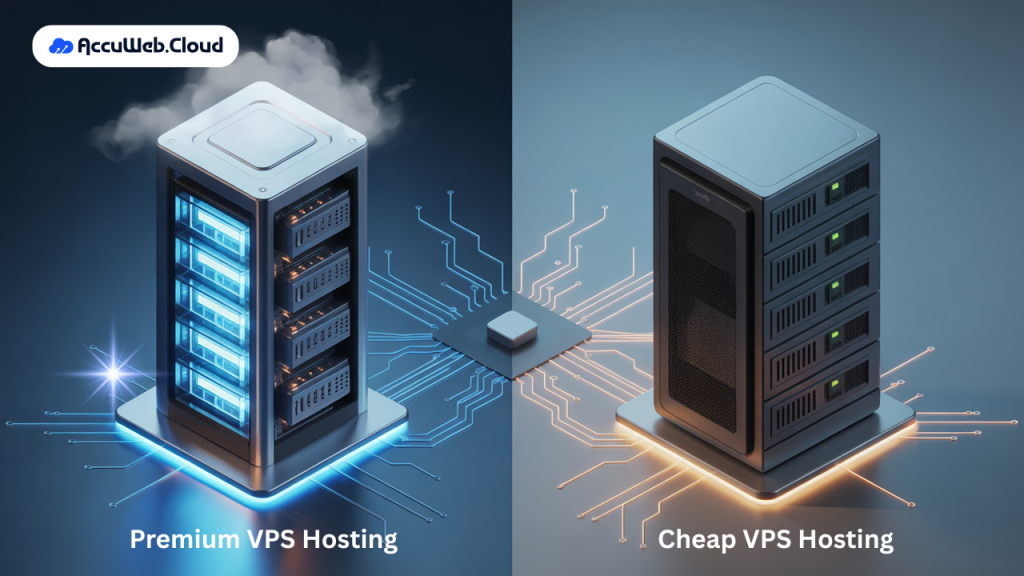Quality VPS Hosting v/s Low Cost VPS Hosting
Are you tempted by a cheap VPS deal? You’re not alone. Many of us think, ‘Why pay more when I can get a cheaper option?’ But here’s the catch: that ‘bargain’ VPS could turn out to be one of the most costly decisions you make.
Let’s break it down: What’s the difference between cheap and premium VPS hosting? If you’re wondering why premium options like AccuWeb.Cloud cost more, stick around. We’ll show you why investing in a premium VPS can make a world of difference for your website’s speed, security, and reliability.
What is VPS Hosting & Why Infrastructure Matters
So, what exactly is VPS hosting, and why does the infrastructure matter so much for your website’s success?
Think of a Virtual Private Server (VPS) as getting your own dedicated slice of a powerful machine – CPU, RAM, storage without the full price tag of a dedicated server. It’s the sweet spot between shared hosting and a dedicated server. You get more control, more resources, and all at a fraction of the cost.
But here’s the kicker: Why should you care about the infrastructure behind your hosting?
Because your website’s performance directly impacts SEO, user experience, and even brand credibility. A slow-loading website or unexpected downtime isn’t just annoying, it’s damaging to your reputation. Search engines like Google prioritize fast websites, and let’s not forget about your mobile users and paying customers, who expect lightning-fast performance. Hosting isn’t just a technical decision; it’s a game-changer for your site’s success.
Quality VPS v/s Low Cost VPS
Let’s lay it out clearly. Here’s a comparison of premium VPS hosting benefits (e.g., by AccuWeb.Cloud) vs cheap VPS hosting risks.
| Feature | AWS’ Quality VPS | Typical Low Cost VPS |
| Node Density | Low‑density hosting, dedicated resources | High‑density hosting, oversubscribed nodes |
| I/O Performance | Enterprise SSDs, high‑performance I/O | Shared I/O, potential slow speeds under load |
| Support | 24/7 support, real engineers available | Limited or no support; often just automated ticketing |
| Proactive Monitoring | Real‑time monitoring of CPU, RAM, disk usage with alerts | No proactive monitoring; you’re only alerted after failure |
| Redundant Power Systems | Redundant UPS + generators to ensure reliable uptime | Basic power systems, no redundancy |
| Security Features | DDoS protection, network firewalls, malware scanning | Basic firewall only, no guaranteed DDoS protection |
| Hardware Quality | Tier‑1 components, ECC RAM, NVMe SSDs | Low‑cost or outdated hardware |
| Backup & Recovery | Automated backups with defined retention policies | No backup policies; manual or minimal management |
| Performance Consistency | Dedicated resources keep your site smooth during traffic peaks | Shared resources lead to slowdowns and crashes under load |
| Scalability | Seamless upgrades as your site grows | Often requires migrating to another provider when you scale |
Ask yourself now: If I lost 1 hour of uptime, or if my site slowed by 2 seconds, what would that cost my business?
If the answer is “it matters”, then you’re already leaning toward premium.
Why Low-Density VPS Hosting Is Worth the Extra Investment
Choosing between low-density and high-density VPS hosting might feel like a tough call, especially when budgets are tight. But here’s the truth: while low-density VPS may cost more upfront, it offers key advantages that make it a smart choice for businesses that can’t afford slowdowns, security risks, or downtime. Let’s break it down:
| Feature | High-Density VPS (Budget) | Low-Density VPS (Premium) |
| Node Density | Multiple clients per server, risking slowdowns | Fewer clients per node, ensuring dedicated resources |
| I/O Performance | Shared disk bandwidth can slow down under load | XX faster disk I/O for smooth performance |
| CPU Consistency | Shared CPU, risking slowdowns | 60-80% better CPU consistency during traffic spikes |
| Reliability | Risk of downtime and bottlenecks | Reliable uptime, even during high traffic |
| Security | Basic security, vulnerable to attacks | Robust security with DDoS protection and firewalls, Malware Protection |
| Backup & Recovery | No dedicated backup, leaving data vulnerable | Automated backups with restore policies |
| Support | Automated support, limited help | 24/7 support from AI as well as Senior Technical Experts |
Why Pay More? Here’s Why Low-Density VPS is the Right Choice:
1. Speed You Can Count On
Imagine a flash sale or product launch – you can’t afford to slow down or crash. Low-density VPS gives you dedicated resources, so your site stays fast and reliable, even during traffic surges.
2. Almost Zero Downtime
Downtime means lost revenue and frustrated customers. With low-density VPS, you’ll have better and reliable uptime, even when things get busy. High-density VPS may be fine for off-peak hours, but it can buckle under heavy load.
3. Better Performance
Low-density VPS offers XX faster I/O and much better CPU consistency, which is perfect for high-traffic sites or critical applications. When performance matters, it’s a no-brainer.
4. Security You Can Trust
Premium VPS services offer top-notch security features like DDoS protection, firewalls, and malware scanning, something cheap VPS options often lack.
5. Scalability for Growth
As your business grows, low-density VPS scales effortlessly without headaches. Cheap VPS may require painful migrations to new servers as you expand, causing unnecessary downtime.
Example:
Imagine you’re running a fintech campaign. Traffic spikes to 10x its normal volume. On a cheap VPS, the shared resources get overloaded your signup process times out, customers get frustrated, and you lose trust, conversions, and SEO rankings.
Now, on a premium VPS, your resources scale automatically, your site stays fast and reliable, and you capture every single conversion.
Breaking Down Hardware & Component Costs
There’s a reason premium VPS pricing is higher: the infrastructure costs more and for good reason. Higher cost upfront often yields fewer headaches later.
Why this matters:
If the hardware is budget, the ‘invisible’ cost shows up as downtime, slower page loads, increased bounce rate, worse SEO, and customer churn.
Why Investing in Premium VPS Is A Smart Choice?
Here’s why businesses choose AccuWeb.Cloud over bargain alternatives:
- Enterprise Hardware: Tier‑1 components, ECC RAM, NVMe SSDs.
- Managed Services: We handle OS updates, security hardening, optimization, monitoring.
- Global Footprint: Data centers in USA, Europe, Asia = lower latency & regional compliance.
- Backup & Recovery: Automated snapshots, defined retention, quick restores.
- Security First: DDoS mitigation, firewalls, malware scanning, alerting 24/7.
- Human Support: Real engineers on chat/phone/tickets no guesswork when minutes matter.
Use‑case fit:
For fintech, e‑commerce, and SaaS: You cannot afford to worry about hosting. You need reliability, performance, and support. Premium VPS is not just a luxury it’s mission‑critical.
Quick Checklist: When Cheap VPS Works & When You Must Go Premium
Cheap VPS may work if:
- You’re running a small personal blog, lightweight site, or test sandbox.
- Traffic is low, conversions non‑critical, downtime acceptable.
- You manage the server yourself and accept risk.
You should choose Premium VPS when:
- Your website/app supports revenue, brand, or fintech operations.
- You expect traffic spikes (sales campaigns, launches).
- SEO, UX, and performance are key to your business.
- You require compliance, security, or 24/7 uptime.
“What would happen if your site was down for 2 hours during your busiest period? Do you know your cost per hour of downtime?” If you don’t, that’s step one in making a smart decision.
Conclusion
Don’t let the allure of a low price tag fool you cheap VPS hosting risks often turn into expensive business mistakes. Investing in a premium solution like AccuWeb.Cloud is about paying smart, not paying more.
It’s about protecting your brand, conversions, and user experience.
If you care about growth, performance, and peace of mind choose premium.
Don’t wait until it’s too late. Ready to elevate your website’s performance? Get in touch with us today to explore our premium VPS options and start optimizing your site for growth!

Jilesh Patadiya, the visionary Founder and Chief Technology Officer (CTO) behind AccuWeb.Cloud. Founder & CTO at AccuWebHosting.com. He shares his web hosting insights on the AccuWeb.Cloud blog. He mostly writes on the latest web hosting trends, WordPress, storage technologies, and Windows and Linux hosting platforms.








